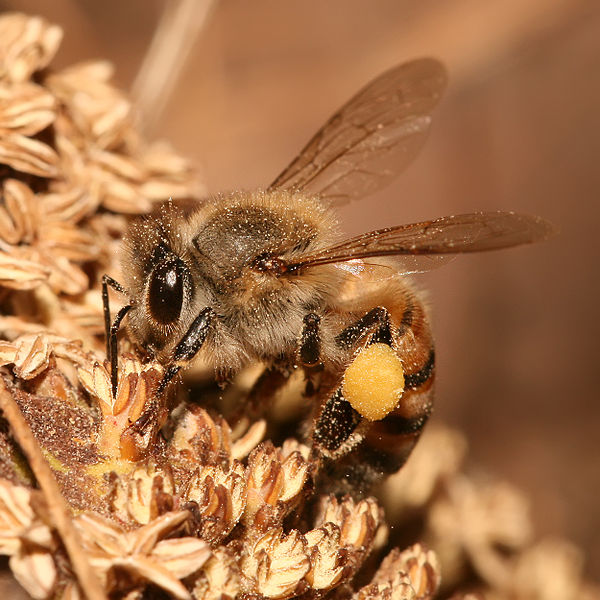Know Your Remedies – Apis Mellifica
 The homeopathic remedy Apis mellifica is prepared from the Western or European honey bee.
The homeopathic remedy Apis mellifica is prepared from the Western or European honey bee.
It was introduced into homeopathy in 1847 by a New York physician Dr. Marcy following the cure of a severely oedematous kidney patient who was prescribed dried and powdered honeybees by a native Indian medicine woman.
As a result of this remarkable cure, the powdered bee was then potentised and tested in provings.
It is now one of homeopathy’s most commonly used remedies, treating complaints as diverse as endometriosis and scarlet fever … when the symptoms match.
COMMON USES
When the remedy matches the symptoms, Apis has the ability to treat conditions such as allergies, angioneurotic oedema, arthritis, ascites, asthma, cystitis, dysmenorrhoea, endometriosis, erysipelas and cellulitis, glomerulonephritis, headache and migraine, infertility, influenza, meningitis, nephrotic syndrome, pharyngitis, pneumonia, pyelonephritis, scarlet fever, shingles, and urticarial (hives).
FROM THE OLD MASTERS
Nash says:
Burning, stinging pains (like bee stings); eyelids; throat, panaritium or felon, hæmorrhoids, ovaries, (especially right one), breasts (mastitis), skin (erysipelas, urticaria, carbuncles).
Great œdema; general or local (face, ears, eyelids, especially lower); throat (diphtheria); genitals (especially scrotum); skin (erysipelas and urticaria); everywhere; general anasarca, abdomen. These œdemas are accompanied with the characteristic pains, or no pain at all.
Stupor, with sharp, sudden, shrill cries in brain disease (crie encephalique).
Thirstlessness, especially in dropsies and during heat of intermittents.
Skin alternately dry and perspiring.
Suffocative; feels as if every breath would be his last, especially in dropsical conditions or hot stage of intermittents.
Modalities: < after sleep, on touch (very sensitive), from heat and warm room; > cold room or air and cold applications.
Bad effects from suppressed or retrocedent exanthemata; measles, scarlatina, urticaria.
Involuntary diarrhœa, with sensation as if anus were wide open.
Lippe says:
MIND AND DISPOSITION.
Restlessness, continually changing his occupation.
Delirium, (after suppressed scarlet eruption).
Awkwardness, he breaks every thing.
Jealousy, (in women).
Giddiness when sitting, standing, lying, when closing the eyes, with nausea and headache.
Congestion to the head, with suppressed menstruation.
Pressing pain in the forehead and temples ; worse when rising, and in a warm bed, relieved by pressing the forehead together.
The brain feels tired.
Hydrocephalus in children, and apoplexy in old persons.
Hydrocephalus, with copious perspiration of the head, torpor, delirium interrupted by sudden shrill cries, boring of the head deep into the pillows, squinting, grinding of the teeth, urine scanty, (milky), twitching on one side of the body, while the other is paralyzed.
GENERALITIES.
Great debility, as if he had worked hard ; he is obliged to lie down.
Burning, stinging pains.
Great sensitiveness to touch and pressure (abdomen).
Tension (over the eyes in the left side of the head) behind ears, in the neck.
Sensation of soreness under the ribs.
CONDITIONS.
Aggravation. In the morning (restlessness, mucus in the mouth, diarrhœa).
In the evening (giddiness, headache, pain in the eyes, toothache, hoarseness, cough, chills and fever).
At night (eyes and chest).
From heat, especially in the warm room.
Amelioration. Cold water relieves the pain, swelling and burning.
Pressing together relieves the headache.
Hering says:
MIND.
Loss of consciousness.
Sopor interrupted by piercing shrieks.
Impaired memory.
Absent-mindedness.
Awkwardness, lets everything fall from his hands.
Dulness of head ; indifference.
Could not bring his thoughts to bear on anything.
Muttering delirium.
Sudden shrill screams. θ Hydrocephalus, etc.
Busy, restless, changing kind of work.
Delusive idea that he must run or hop, that he cannot walk.
Great tearfulness, cannot help crying.
Dread of death.
Apathy, hardness of hearing ; happy expression.
Mood : irritable ; hard to please ; nervous.
Violence amounting to frenzy.
Jealousy (in women).
Manias, especially proceeding from sexual cause in women.
SENSATIONS.
Burning, stinging like bee-stings, and soreness, seem to be the predominating painful sensations -while itching, tension and throbbing may be or may not be painful.
Numbness of external parts.
TISSUES.
Affections of circulatory apparatus and fluid, dropsies, phlebitis, varicose veins, ecchymosed spots gangrene, unhealthy suppuration.
Periosteum inflamed.
Serous membranes : inflamed ; effusions ; synovitis.
Mucous membranes inflamed and catarrhal.
Glands enlarged, inflamed.
Muscles stiff, tender on pressure, somewhat swollen ; rigid rheumatic inflammation.
Indurations : scirrhus, or open cancer.
STAGES AND STATES.
Strumous diathesis.
Bilious, nervous temperament ; women and children ; especially widows ; girls, who though generally careful, become awkward, and let things fall while handling them.
Old people, asthma.
Those predisposed to miscarry should not receive Apis except in high potencies.
Sources:
Textbook of Materia Medica by Adolph Lippe M.D. 1886 Publishers: AJ.Tafel
Constantine Hering. 1877. Condensed Materia Medica. Publishers: Boericke and Tafel
E. B. NASH. 1899 Leaders In Homoeopathic Therapeutics. Publishers: Boericke and Tafel






